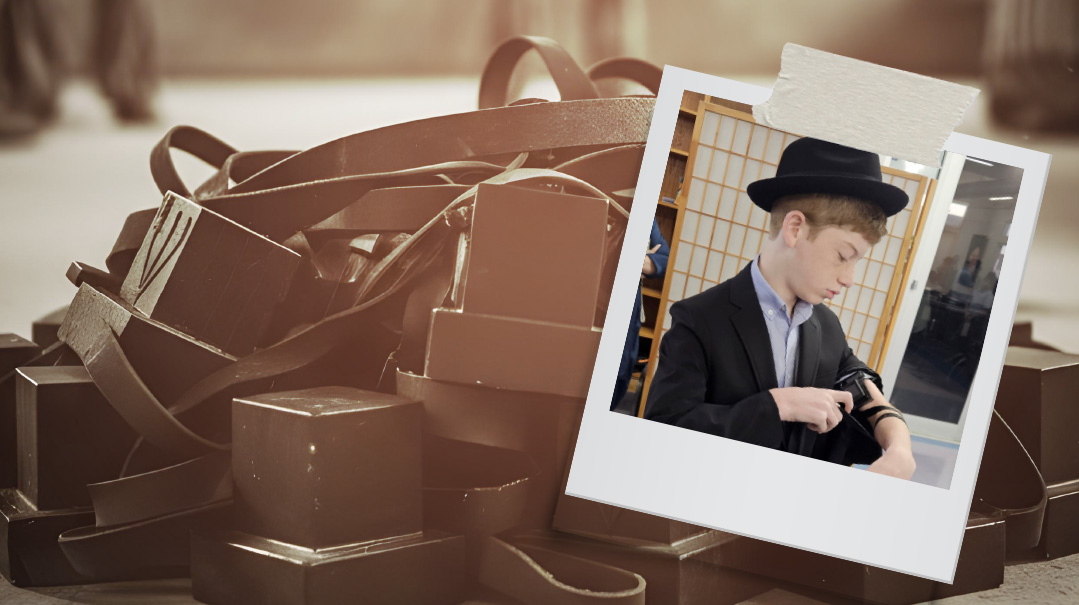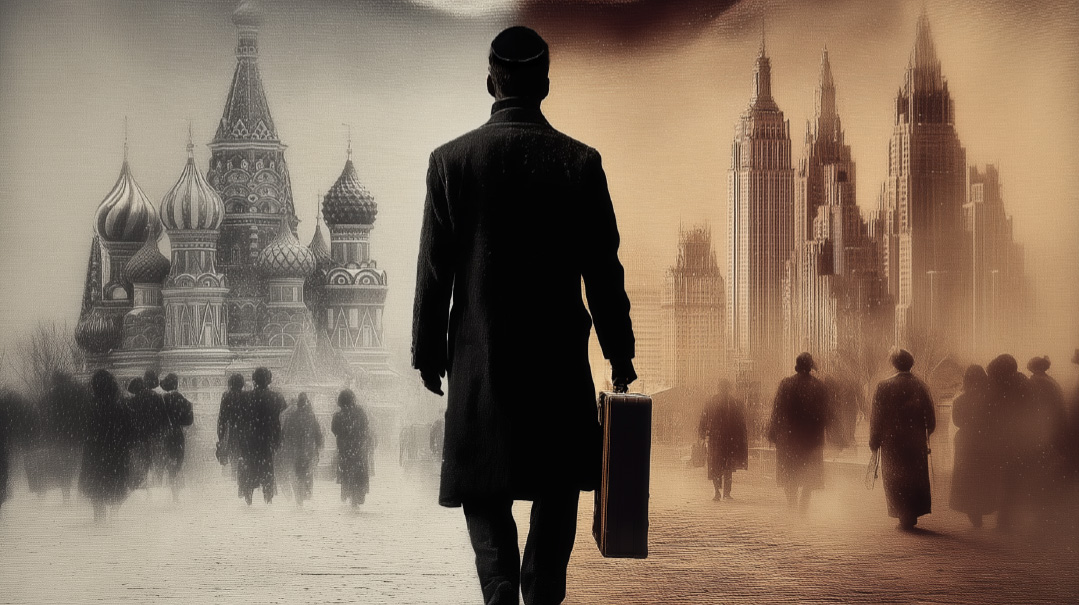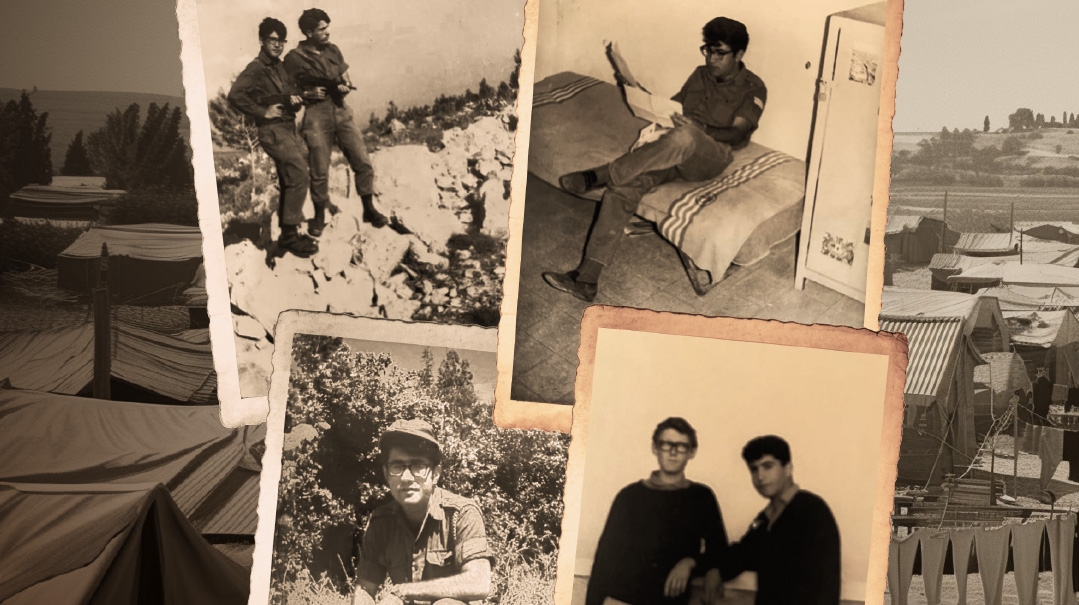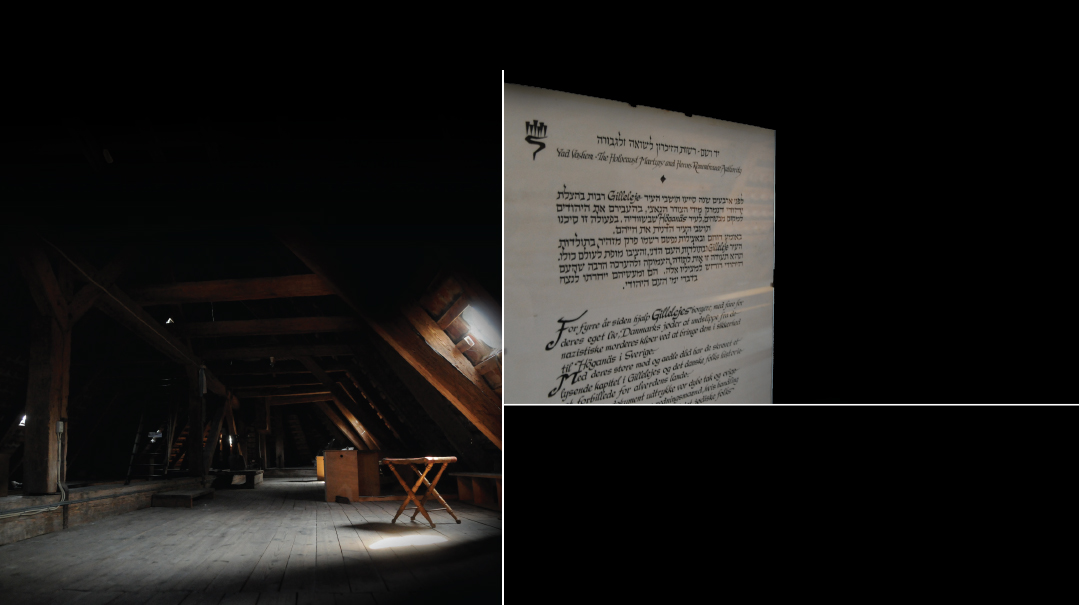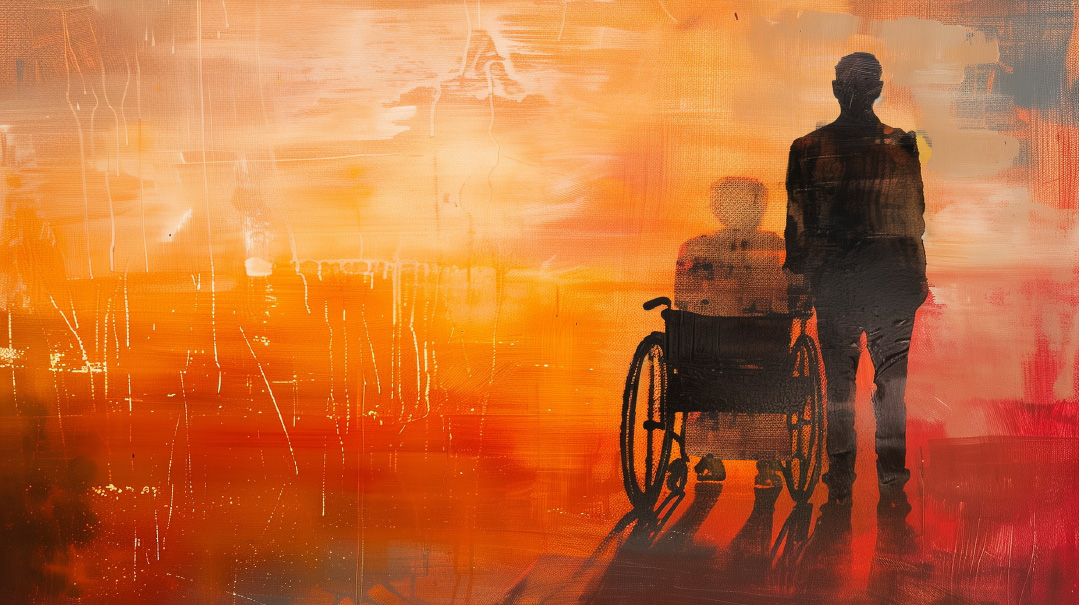Abandoned to Survive

The forest is swarming with Germans, and I’m just six years old, leading a group of even younger children through the trees. Now we’ve come to a fork. One path will lead to freedom, the other to certain death. I’ve never felt so forsaken…
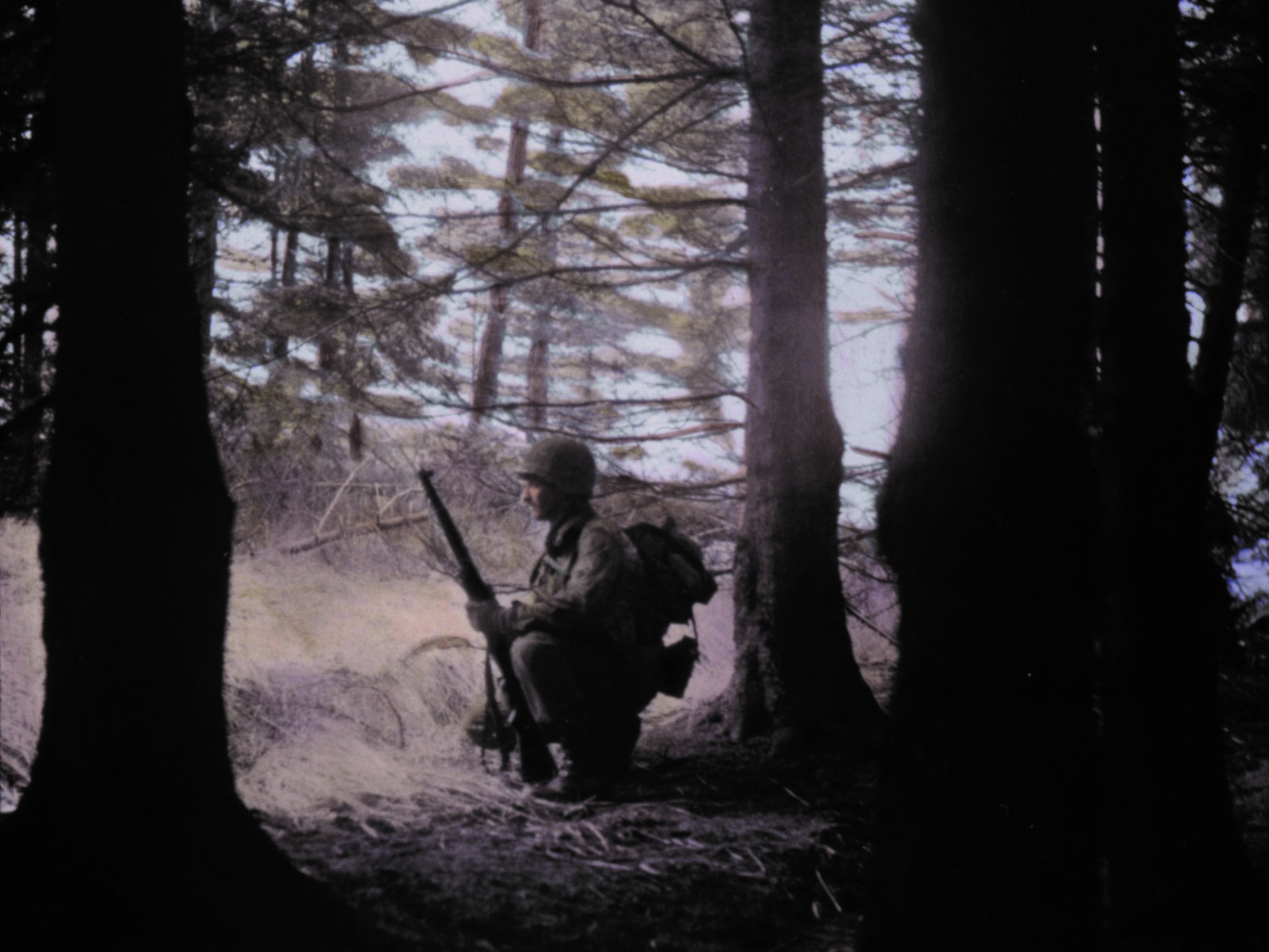
T
he feeling hits me at the oddest times.
Like the time I accompanied my friend Yanky to his son’s cheder.
“Come along with me,” he said as we were talking. “My six-year-old is in school crying and I have to go pick him up. Looks like he’s in a trauma.”
I got into the car with him, thinking, “Six years old?”
The boy rushed into his father’s arms, snuggling up as if he wanted to burrow into oblivion as Yanky stroked his head and shoulders, soothing his little boy’s heaving sobs.
I watched and felt a stab in my heart. For just a split-second, I felt sorry for myself.
Where was I when I was six years old? Why didn’t I have any Tatte to hug and stroke me during the most precarious time of my life?
*
A
nd then there was the time my wife and I were strolling through the little wooded area by the Kinar Hotel. A soft breeze was blowing from the blue waters of the Kinneret, rustling the branches and gently caressing our faces.
Suddenly a boy of six or seven came running amid the sparse trees, looking around wildly like a frightened, trapped animal. We approached him to see how we could help, and it turned out that the poor little fellow had lost sight of the path leading to his parents’ room in the hotel. I brought him to the dining hall, and he found them there.
A shiver of dread came over me. Days later I was still feeling somewhat depressed, or to be more precise, an uncontrollable sadness. The trees in that little grove had whispered a sad story.
“Why?” I protested aloud. “Why does it still trouble me? It was so, so long ago!”
*
I
t happened again in the middle of the Yom Kippur War.
I was stuck in an anti-aircraft embankment on the shore of the Red Sea, in the Sinai Desert near Ras Abu Rudeis. It was exactly nine p.m. Suddenly, the fragile desert silence was broken as a siren wailed through the sound system that was connected to several kilometers of embankments along the shore. We sprang to full alertness and took up battle positions. And then came the command: “Take positions. No open fire order.”
After a moment of nerve-racking silence, the system crackled and the voice returned: “An Egyptian commando squadron appears to be moving toward us on boats. Guard the shoreline and if necessary, return fire! Stay in position until reinforcements arrive.”
It was petrifying. We were reservists, we’d been there just a week. We hadn’t learned the secret language of the desert and the tricks of the waters that separated us from Egypt on the other side. Especially in the dark of night, we could not interpret the ominous lapping of the waves on the shore where we were entrenched.
But we quickly took up our battle positions, alert to whatever would come. The enlisted men took cover in the darkness and left us, a handful of reservists, to do the work.
The silence was like a clenched fist over the water, and the choppy waves whispered vague threats in our ears. The blackness of a new moon night hung over us, and even the stars had put out their lights. In the darkness, our eyes were fixed on every breaking wave, straining to see if this might be the one carrying the enemy to our doorstep.
And then, there it was again.
Every fighter felt a sense of overwhelming isolation. The thoughts of every heart drifted northward, to the home and family left behind.
And in some hidden spot deep in the recesses of my mind, that mysterious, sleeping little trigger jumped. I’d felt it before, that feeling of being left alone in threatening surroundings. It was no vague sense of dread; it was like a cold vise gripping my entire being — just like then. Just like then, when I was left on my own, without father or mother, six years old on the border between France and Switzerland.
In those precarious moments, I wondered: Would that memory never stop coming, uninvited and unannounced, to revisit me?
*
I
was six, perhaps six and a half, when it all happened. I’m not quite sure; it was so long ago. But I remember very clearly how I felt at that moment when we arrived at the forest, accompanied by a kind French woman.
There we were, four little children, torn from our parents’ arms. With me were my five-year-old sister and another brother and sister pair, two children of another family who had hidden along with us in a small French village, on the run from the Germans and their loyal collaborators, the gendarmes of the Vichy regime.
Our parents, who had fled from Belgium to rural France, had eventually become known to the emissaries of Satan and they were well aware that the noose was slowly tightening, their fate apparently sealed.
They told me years later that they’d decided to try to save the children, at least, from the horrible fate that awaited them. They found a French woman who was willing to risk her life in return for the payment they offered and smuggle us over the border to neutral Switzerland, which was so careful to stay out of the war. Once over the border, I, as the eldest, was to be “in charge” of the younger ones.
The Jews of Western Europe had pinned their hopes on Switzerland, and many did succeed in crossing the border and finding asylum there legally. But once their coolly-calculated quota was reached, the Swiss authorities chased the rest of the Jewish refugees back over the border, straight into the Nazi death machine.
My parents chose the Swiss route for us, since at least it offered some chance of survival. I was given a short list of names and addresses of people our parents knew in Zurich, so that if b’chasdei Hashem, we should manage to cross the border and reach safety, I, the six-year-old, could find some way of informing them that the children of their acquaintances had arrived.
Meanwhile, through some clandestine means, my parents had already managed to get word to them that we were on the way.
I have no memory of saying goodbye to my parents. But my mother, who actually made it across the border together with my father at a later date, told me about the heartrending scene that took place when, with our childish understanding, we realized that this was it, we were losing our parents.
Forty years later, tears still appeared in my mother’s eyes when she recalled that day and how bitterly I cried. “I’ll be lost! You’ll never see me again!” I said to them. My little heart was terrified of the unknown that lay ahead. The fact that my little sister was sick that day only added to their agony.
“You don’t send away a sick child. She’s supposed to stay home with her mother,” we wailed.
No, it wasn’t the most cheerful of days. But for all our protests and weeping, what else was there to do? What choice did our parents have, and what could we children do about it? The French woman came to take us, and that was the end of it.
I don’t remember how we got to the border. I think she took us by train. I do remember walking on a road with a barrier looming up ahead. A guardhouse stood beside it, and several armed border policemen were gathered nearby.
The gentile woman walked with us toward the barrier. Some cyclists rode past us, and the border guards stopped them. The cyclists showed them some documents, and the barrier was opened to let them through.
I remember that I understood this much: Switzerland was on the other side of that barrier, and we had to get there. I also understood that we couldn’t simply pass through the way the cyclists had. And if I did imagine that we could pass through, I was immediately set straight by the border policeman who suddenly stood before us with his gun drawn and aimed at us, barking an order to go back to where we’d come from.
“Je vais tirer! (I’m going to shoot!),” he shouted. Those terrifying words still remain etched deep in my subconscious.
And I remember the French woman answering him calmly, “We’re just out for a stroll.” And then she turned and led us to the forest alongside the road.
Fortunately, the gendarme lost interest in us at that point. We entered the woods, where the border continued — persecution on one side and freedom on the other.
I don’t remember the moment when our guide left us on our own. I only remember the awful fear that suddenly came over me. The trees towered over our heads, and if the sun was out that day at all, its rays were not filtering through the thick canopy of branches above. And so we made our way in the dark. We walked, and walked, and walked, between the trees that seemed so immensely tall. At least we were following a path of sorts, where the forest floor had been flattened by the footsteps of others who had come before us. Still, we had no idea where it was leading us, how long the way would be, or what we would encounter if we ever reached the end.
We were so alone. Even now, as I write, that terrible sense of abandonment engulfs me. Maybe we cried, maybe not. I remember passing a little stream and going on. I don’t know how long we walked. An hour? Two hours or more? Perhaps less than an hour… I just don’t know.
And then we came to a fork in the trail. The four of us stood there, waiting. Waiting for what? I don’t know. I suppose we couldn’t decide which path to take.
The fact that we stopped and hesitated turned out to be pivotal to our fate.
All of a sudden, a soldier appeared out of nowhere. “Come here!” he called to us in German.
I was petrified, looking around wildly in fright. Was this a German soldier?
The other children left in my care cast frightened, questioning looks at me. Immediately, I remembered my instructions to get rid of the little list of names and addresses I had in my pocket if we should be caught by the Germans. To the best of my recollection, I swallowed it.
The soldier came up to us and told us to follow him. What choice did we have? We followed him, our knees quaking. A small army vehicle stood not far off. Without a word of explanation, he pushed us into the backseat, and we were on our way.
I remembering sitting there, absorbed in my own fears while the other children huddled close to me, seeking my protection. Was I crying? Maybe. How long was the trip? Again, I don’t know.
Finally we reached a small guardhouse. As soon as he had us out of the car, the soldier pushed us into the guardhouse and down onto the floor. “Keep your heads down!” he ordered.
Not far off, I could see a German patrol walking along slowly. The soldier hadn’t wanted him to see us. I have a foggy memory of him explaining to someone there in the guardhouse, probably an officer, that he’d seen us children walking on the path and hitting the fork, where we had stood wondering which way to go, and that he’d heard shots coming from the path on the left.
Finally it dawned on me — this was a Swiss soldier who’d picked us up! What a relief! Had we continued on the left-side path, we would have fallen straight into German hands.
*
T
hen we were riding in the car again, until we reached a big camp. Or at least to me it seemed enormous. Throngs of people were milling about, and no one paid any attention to us children.
The soldier who had brought us there had us take seats at a table near a kitchen and disappeared.
We huddled together fearfully, not daring to utter a word. We didn’t know what sort of place this was. There were so many people, but not one of them approached us or even looked at us.
I suppose we must have cried for our mothers and fathers, but I can’t actually remember doing so. We sat there for a while, and eventually a soldier, perhaps an officer, came up to us and asked us in French who we were. We said we had come from France. “Have you eaten anything?” he asked, and we said no.
I remember that he immediately went to the kitchen, and shortly afterward each one of us was served a plate of soup. I still have fond memories of that soup and its wonderful aroma.
My readers will excuse me for remembering so little about the camp. I remember being taken to a long shed full of people, adults and children. There were no beds there, only straw spread over the floor, and this was our lodging for the night. The other occupants of the shed unceremoniously shooed us out of their staked-out territory, shouting that we had come only a short distance. We finally found a far corner where we could sit down.
With the passage of years, I learned to judge those people with compassion, although they showed no pity for four small refugee children without their parents. They were refugees just like us, desperately fleeing from death.
The four of us lay down in our corner, my sense of utter aloneness still gripped me — for we were aliens there with no one to defend us, and no idea what tomorrow would bring.
*
A
nd then, suddenly, we were in Zurich, in a beautiful house, with affluent-looking people standing around us, smiling and speaking to us lovingly.
How had we gotten here? Who were these nice people? For years, I didn’t know.
The four of us stood there, abashed and confused, as one of the ladies told us that we were going to be separated. Each of us was to be taken in by a different foster family. I remember that for us, the main point of that little speech was that we would no longer be together, and that we didn’t know these people. Until then, all our hopes for survival lay in the fact that we were together, and now each of us would be alone in a strange city, under the care of strangers.
I remember well the awful scene that took place there, in the home of the people I later learned were called Family Wolodarski. We children went to pieces when we heard we were to be split up. There was crying and vomiting, throwing ourselves down on the floor in despair, grabbing hold of furniture as if that would prevent the strangers from taking us away.
Our terror-filled outburst was to no avail, of course. We were split up and taken to our respective foster families.
My foster parents, Daniel and Esther Levenstein, may their memory be forever blessed, made every effort to ease my suffering. They brought me into their handsome home and pampered me in every possible way. But for many nights I couldn’t sleep, and when I finally drifted off I would soon wake up, screaming in terror. Wonderful Mrs. Levenstein tried her best to comfort me, not always successfully. Gradually, I adjusted, and for over a year I lived in the home of this special family who showered this little refugee with love.
To this day, I often think of the Hashgachah that protected me, while a million and a half Jewish children were exterminated. Why was I chosen for life? The question still plagues me.
*
But a piece of the story is missing, a piece that I myself was unaware of for many years. How did we get to Zurich? Our arrival there wasn’t due to the list of names and addresses my parents had given me — I had swallowed it the moment I heard the Swiss soldier address us in German. So how did those good Jews find us, extract us from that refugee camp, and give us back the childhood that had been snatched away from us? How did they even know of our existence?
Thirty years later, I found out the secret.
While in Zurich on a lecture tour, I phoned Rebbetzin Rosengarten, whose family was one of the three that my parents knew there. I asked her if she could explain the mystery.
And this is what she told me:
They had received information that the children of the Grylak and Broner families should be arriving in Switzerland, and they were constantly checking the Swiss government’s lists of refugees that had successfully crossed over, which were updated and publicized regularly. But to their great consternation, our names never appeared. They couldn’t help but entertain the dreadful thought that we might have been caught by the Germans.
Perhaps, chas v’chalillah, we had been the targets of the shots heard on that left-hand path…?
And then, one Friday, Mrs. Rosengarten had gone to visit a sick woman in the hospital in Lausanne, a city in southern Switzerland. Walking through the hospital corridor, she noticed a little boy in the doorway of one of the hospital rooms, speaking in French to someone in the room. Just as she was passing by, she heard him say worriedly, “I don’t know what’s going to be. I don’t know what time Shabbos comes in.”
So this was a Jewish boy! Mrs. Rosengarten stopped in her tracks and asked him, “Who are you?”
“Maurice Grylak,” the boy replied, using his French name.
She stood there thunderstruck. As soon as she could get to a phone, she called Zurich and announced joyfully, “We’ve found the children!”
What were we doing in the hospital? My sister Chavah, who’d already been sick when we set out for the border, had become quite ill in the refugee camp. The officer in charge gave orders to take her to the hospital, but she refused to go without me. Realizing that we were still traumatized, the officer relented and allowed me to accompany her. Miraculously, Mrs. Rosengarten “just happened” to go out of town to Lausanne on a bikur cholim visit that Friday. And I “just happened” to be standing in the doorway of my sister’s hospital room expressing my worry about Shabbos at the very moment that Mrs. Rosengarten “just happened” to pass by.
And the rest is history.
*
S
till, there’s one mystery I have yet to solve: Why does that dreadful feeling of aloneness assail me again and again, in so many diverse settings? What is there, in that forest scenario, that insists on coming back to me, that refuses to stop pursuing me?
I know I was very fortunate. That childhood trauma cannot compare to the suffering endured by other Jews, imprisoned in ghettoes and concentration camps. Yet still I wonder, why does it never go away?
But perhaps that is just the point. Perhaps it is the kindness of the Borei Yisbarach that is pursuing me, and every time that memory of the forest looms up in my mind, I should stand up and thank Him for His protection — for holding me back from taking the left-hand path that led to a death trap; for sending that Swiss soldier who made us keep our heads down; for the Swiss army that took in four Jewish children; for my sister’s illness that brought us to the hospital, and the fear that made her insist that I come along; for putting concern about Shabbos into my mind at the very moment that Mrs. Rosengarten was passing by her room.
And perhaps, indeed, this is why I write this testimony: to thank Him once again for the Hashgachah that was, and has continued to be, so kind to me.
(Originally printed in Mishpacha Issue 622)
Oops! We could not locate your form.







